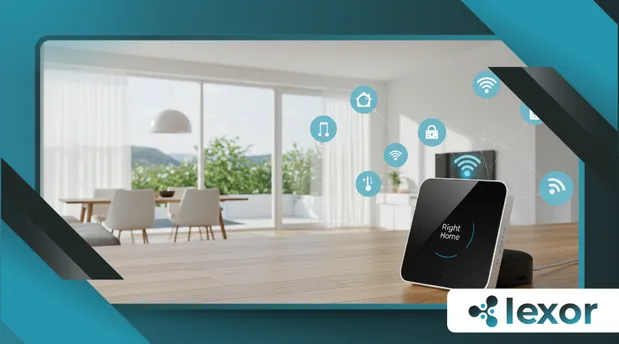How to Choose the Right Smart Home Hub for Your Needs

The concept of a smart home hub has become a cornerstone of modern living, seamlessly connecting devices and transforming houses into intelligent ecosystems.
But with so many options flooding the market, how do you pick the perfect one for your lifestyle?
This guide will walk you through the essential factors to consider, ensuring your investment aligns with your needs and future-proofs your home.
As you embark on this journey, it’s crucial to understand that the right hub can significantly enhance your daily routines and overall quality of life.
By taking the time to evaluate your specific requirements, you can make a more informed decision that will serve you well in the long run.
Understanding the Role of a Smart Home Hub
A smart home hub acts as the brain of your connected home, unifying devices like lights, thermostats, security cameras, and voice assistants under one system.
According to a 2023 report by Statista, over 40% of U.S. households now use at least one smart home device, highlighting the growing reliance on these technologies.
However, not all hubs are created equal. Some prioritize compatibility, while others focus on user experience or advanced automation.
Understanding the specific functionalities of each hub will empower you to choose one that aligns with your lifestyle.
For instance, if you value security features, some hubs offer advanced encryption and local processing, which can be critical for protecting your data.
To make an informed decision, you need to evaluate your current devices, future goals, and the ecosystem you want to build.
Let’s break it down step by step.
+ The Future of Smart Homes: What to Expect in 2025 and Beyond
1. Compatibility: The Foundation of Your Smart Home
Before diving into features, assess which devices you already own or plan to purchase.
A smart home hub is only as good as its ability to communicate with your gadgets.
Major ecosystems like Google Home, Amazon Alexa, and Apple HomeKit dominate the market, but not all hubs support every device.
When selecting a hub, consider not only the devices you currently have but also any future purchases you might make.
This foresight can save you from compatibility issues down the line, ensuring a more seamless integration of your smart home devices.
For example, if you’re an iPhone user with a HomePod, Apple’s HomeKit might be your best bet.
On the other hand, if you rely heavily on Alexa-enabled devices, an Amazon Echo with a built-in hub could be more practical.
Pro Tip: Check for Zigbee or Z-Wave compatibility if you want to connect a wide range of third-party devices.
These protocols ensure broader interoperability beyond the big-name ecosystems.
For a detailed comparison of smart home devices, visit Smart Home Solver.
2. Ease of Use: Simplifying Your Daily Life
A smart home hub should make your life easier, not more complicated.
User-friendly interfaces, intuitive apps, and seamless integrations are non-negotiable.
For instance, Google Nest Hub excels with its visual interface, making it easy to control devices with a simple touch or voice command.
The learning curve of a new system can greatly impact your overall satisfaction.
A hub that is easy to navigate will encourage more frequent use, allowing you to fully utilize its capabilities.
Consider how tech-savvy you are and who else will be using the system.
If you’re sharing your home with family members, opt for a hub that’s straightforward and accessible for all ages.
Taking into account the comfort level of all users ensures that everyone can benefit from the smart home technology without frustration.
User reviews can provide valuable insights into the usability of different hubs, so be sure to check those before making a decision.
3. Automation Capabilities: Beyond Basic Control
One of the most exciting aspects of a smart home hub is its ability to automate routines.
Imagine waking up to your blinds opening, lights dimming, and coffee brewing—all triggered by a single command or schedule.
Automation not only enhances convenience but can also improve energy efficiency by optimizing device usage throughout the day.
The ability to schedule tasks can lead to a more organized lifestyle, freeing up time for other activities.
Hubs like Samsung SmartThings offer advanced automation features, allowing you to create complex routines based on time, location, or device activity.
If you’re someone who loves tinkering with technology, this level of customization can be a game-changer.
Experimenting with different automation scenarios can lead to new and innovative ways to enhance your daily life.

4. Voice Assistant Integration: The Power of Hands-Free Control
Voice assistants have become a staple in smart homes, and your choice of hub often determines which one you’ll use.
Amazon’s Alexa, Google Assistant, and Apple’s Siri each have their strengths.
Alexa, for example, boasts the largest library of skills, making it highly versatile.
This versatility can be particularly beneficial if you enjoy using voice commands to control various aspects of your home, from lighting to entertainment.
Google Assistant, on the other hand, shines with its natural language processing and integration with Google services.
This makes it an excellent choice for users who rely heavily on Google apps and services in their daily lives.
Meanwhile, Siri offers a seamless experience for Apple users but is more limited outside the Apple ecosystem.
Choosing a hub that aligns with your preferred voice assistant can greatly enhance your smart home experience.
5. Security: Protecting Your Connected Home
With great connectivity comes great responsibility.
A smart home hub is a gateway to your personal data, so security should be a top priority.
Look for hubs with robust encryption, regular firmware updates, and two-factor authentication.
These features are essential in safeguarding your home network from potential cyber threats.
Investing in a secure hub can provide peace of mind, knowing that your data is protected from unauthorized access.
Brands like Hubitat prioritize local processing, meaning your data stays on your network rather than being sent to the cloud.
This approach not only enhances privacy but also ensures your system remains functional even during internet outages.
As smart home technology evolves, staying informed about security practices is crucial for maintaining a safe environment.

6. Scalability: Planning for the Future
Your smart home is likely to grow over time, so choose a hub that can scale with your needs.
Some hubs support only a limited number of devices, while others can handle hundreds.
Planning for future expansions can save you from having to replace your hub later on.
Consider how your lifestyle might change in the coming years and whether your hub can adapt accordingly.
For instance, the Aeotec Smart Home Hub is known for its scalability, making it a favorite among tech enthusiasts who constantly add new gadgets.
Think about your long-term goals—whether it’s expanding your security system or integrating smart appliances—and pick a hub that can keep up.
A scalable hub can provide flexibility and adaptability, allowing you to seamlessly integrate new devices as they become available.
++ Smart Security Systems: Protecting Your Digital Home
7. Budget: Balancing Cost and Features
While it’s tempting to go for the most feature-packed smart home hub, your budget will ultimately guide your decision.
Entry-level hubs like the Amazon Echo Dot are affordable but may lack advanced features.
On the other hand, premium options like the Apple HomePod offer top-notch performance but come with a higher price tag.
Finding the right balance between cost and functionality is key to making a wise investment.
Consider this: A 2022 survey by Parks Associates found that 60% of smart home device owners prioritize affordability over brand loyalty.
Don’t overspend on features you won’t use.
Instead, focus on what aligns with your needs and offers the best value for money.
By setting a budget and sticking to it, you can ensure that your smart home system remains affordable while still meeting your requirements.
8. Ecosystem Lock-In: Avoiding Vendor Dependence
One often-overlooked factor is ecosystem lock-in.
Choosing a hub tied to a specific brand can limit your flexibility down the line.
For example, if you invest heavily in Apple’s ecosystem, switching to a Google-based hub later could be costly and inconvenient.
Vendor lock-in can lead to frustration if you find that your devices are incompatible with your new system.
To avoid this, opt for a hub that supports multiple ecosystems or uses open standards like Matter, a new universal smart home protocol designed to improve interoperability.
Choosing a hub with open standards can provide greater flexibility and future-proof your smart home setup.
This way, you can mix and match devices from different brands without worrying about compatibility issues.
Comparison Tables: Finding Your Perfect Match
To simplify your decision-making process, here are two comparison tables highlighting popular smart home hubs and their key features.
Table 1: Top Smart Home Hubs for Compatibility
| Hub Model | Google Home | Amazon Alexa | Apple HomeKit | Zigbee/Z-Wave | Matter Support |
|---|---|---|---|---|---|
| Google Nest Hub | Yes | Limited | No | No | Yes |
| Amazon Echo (4th Gen) | Limited | Yes | No | Yes | Yes |
| Apple HomePod Mini | No | No | Yes | No | Yes |
| Samsung SmartThings | Yes | Yes | Yes | Yes | Yes |
Table 2: Smart Home Hubs by Price and Features
| Hub Model | Price Range | Voice Assistant | Automation | Security Features | Scalability |
|---|---|---|---|---|---|
| Amazon Echo Dot | $30-$50 | Alexa | Basic | Standard | Limited |
| Google Nest Hub (2nd Gen) | $100 | Google Assistant | Advanced | Standard | Moderate |
| Apple HomePod Mini | $99 | Siri | Advanced | High | Moderate |
| Hubitat Elevation | $130 | None | Advanced | High | High |
Final Thoughts: Making the Right Choice
Choosing the right smart home hub is a deeply personal decision that depends on your unique needs, preferences, and budget.
By considering factors like compatibility, ease of use, automation capabilities, and security, you can narrow down your options and find a hub that truly enhances your daily life.
Remember, the best smart home hub is one that grows with you, adapting to your evolving lifestyle and technological advancements.
Taking your time to evaluate different options will lead to a more satisfying and effective smart home experience.
Do your research, read reviews, and don’t hesitate to test out different systems before committing.
After all, your home deserves nothing but the best.
